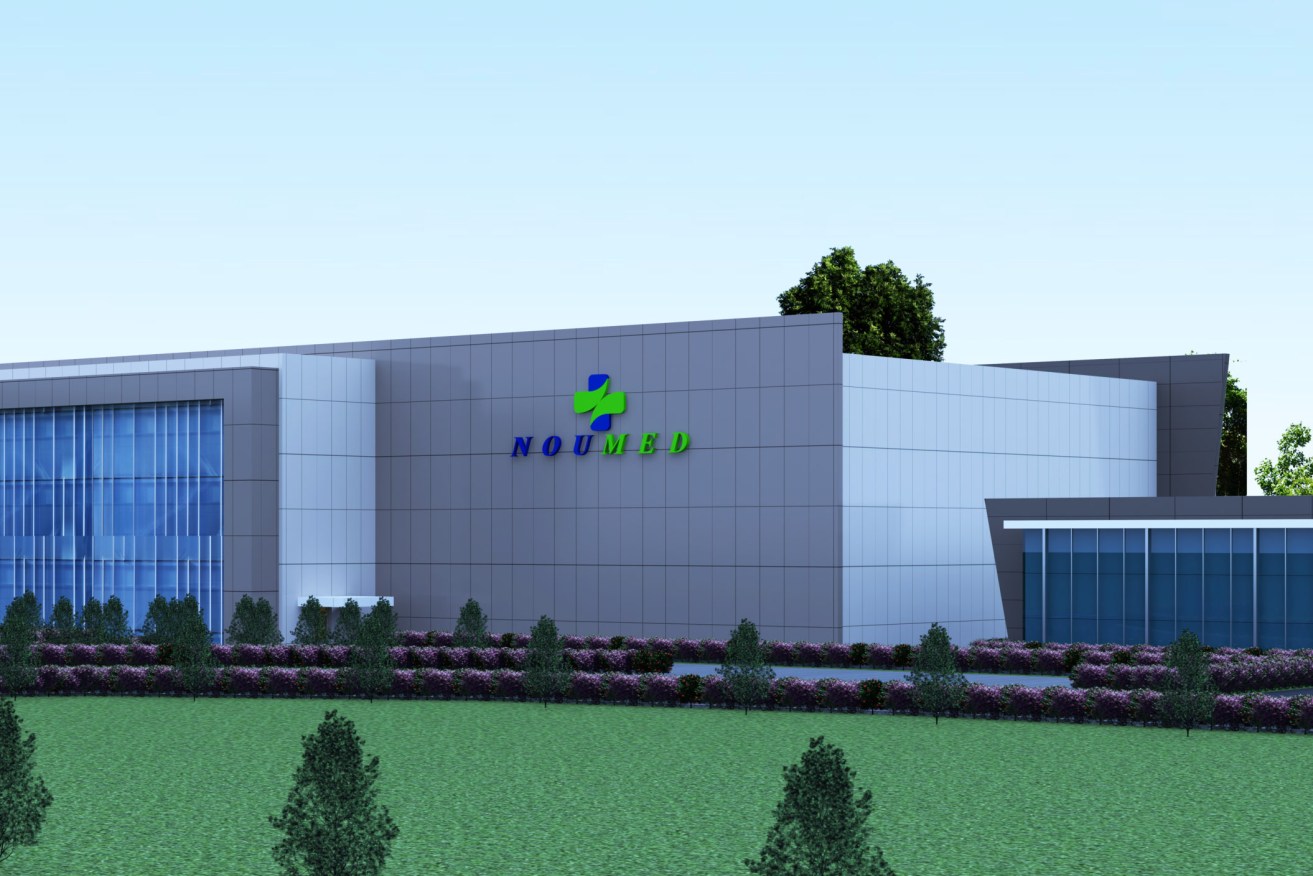Salisbury South hub key to expanding SA’s pharma industry
UK pharma company Noumed Pharmaceutical is positioning its proposal for an $85 million manufacturing plant in Adelaide’s northern suburbs as a key part of South Australia’s 10-year health and medical industries strategy, as the State Government continues its push to more than double the size of the sector by 2030.


An artist's rendition of Noumed Pharmaceutical's proposed $85 million manufacturing facility in Adelaide's northern suburbs (Image: Supplied)
The Maidenhead-based firm, who is a global supplier of prescription and over-the-counter medicines, earlier this month announced plans to build the drug manufacturing facility in Salisbury South with $20 million in construction support from the Federal Government.
The proposed plant would be located at the Nexus North Industrial Estate, next door to fellow pharmaceutical firm ASX-listed Mayne Pharma and just up the road from other medical manufacturers including ophthalmic equipment makers Ellex Medical.
The site is also just five minutes away from South Australia’s Mawson Lakes defence precinct where BAE Systems and SAAB are already located, with Lockheed Martin and Raytheon looking to join in the coming years.
Noumed stakeholder relations consultant Sally Modystach said the location was ideal for high-tech manufacturing.
“This estate has suitable land area for Noumed’s operation and caters well for high-tech industries,” she said.
“It also offers convenient access to major transport routes such as Main North Road, Salisbury Highway and the North-South connector.”
Noumed expects its Adelaide facility to be completed in 2025, creating 250 jobs during construction and a further 180 permanent jobs once completed.
The company also plans to manufacture 40 million units of “key commodity products” (tablets, liquids and creams) per year in Australia, which are currently being imported.
“Noumed’s plant in South Australia is being designed to have a manufacturing capability to supply the Australian Pharmacy and Hospital landscape in key commodity medicines,” Modystach said, adding that the company’s plant in Maidenhead would retain the same focus for the UK market.
“The Noumed development aligns with South Australia’s expanding strengths within the ‘Health and Medical Industries’ Sector Plan 2020-2030’ which looks to increase the value of the health and medical industries to the SA economy.”
The State Government’s HMI sector plan, released in October last year, aims to more than double the size of the industry from $2.3 billion currently to $5 billion by 2030.
To achieve this target, the sector’s rate of growth would have to increase from 2.9 per cent annually to 6.5 per cent by 2030, according to the report.
The underlying assumptions for this growth outlined in the plan include growth in “sovereign supply and capability growth” and an increase in pharmaceutical exports.
In the pharmaceutical subsector, the plan acknowledges challenges associated with the state of Australia’s pharmaceutical industry, stating: “Australia represents a small market with approximately one per cent of global pharmaceutical and medical technology sales.”
The report also outlines a series of challenges in the HMI sector brought about by the pandemic, including decreased access to raw materials, increased freight costs for both importers and exporters, reduced access to advisory services due to restricted travel, and an increased risk of bad debt.
Despite COVID-19’s challenges and Australia’s status as a small pharmaceutical market, a spokesperson for the State Government said Noumed would be well supported by its industry partners in South Australia.
“Adelaide is a pillar of what can be a resilient, sustainable and sovereign drug development and manufacturing industry,” the spokesperson said.
“Adelaide’s supporting ecosystem already has maturity, with the companies and organisations here establishing highly symbiotic manufacturing relationships that are horizontally integrated to increase respective production output, drive innovation, expand reach and scope.
“South Australia has, for a long time, actively supported investment in the state’s network of precincts and corporate capabilities which underpin pharmaceutical and nutraceutical manufacturing, fostering a long-term capacity and capability for the state.”
The government spokesperson said Noumed was a “good example” of a company making a strategic decision to access South Australia’s pharmaceutical ecosystem.
“Likewise, the Australian Government’s investment to support Noumed in South Australia reflects the importance of establishing South Australia as a major pharmaceutical manufacturing hub.”
Noumed’s plunge into the South Australian market comes as another overseas firm looks to SA to support its biomedical ambitions.
Biologics contract development and manufacturing firm BioCina this month officially submitted their response to the Federal Government’s approach to market to establish onshore mRNA vaccine manufacturing.
The Federal Government’s application deadline passed on Friday, July 16, with 12 companies across the country reportedly putting their hand up for an undisclosed amount of Commonwealth funding.
BioCina, a subsidiary of US private investment firm Bridgewest Group, is pushing for its 4600sq m facility in Thebarton to be the nation’s mRNA manufacturing hub, touting the manufacturing plant as “the most advanced facility of its kind in Australia” and the only one to have received approval from the US Federal Drug Administration.
The firm submitted its proposal alongside the South Australian Health Medical Research Institute and the University of Adelaide.
BioCina CEO Ian Wisenberg also confirmed to InDaily last week its proposal is in conjunction with a South Australian industry partner who is capable of carrying out the sterile fill and finish component of the mRNA manufacturing process – a critical part in allowing the vaccines to be safely distributed.
While a successful bid could mean a significant boost to South Australia’s HMI sector, BioCina is expected to face stiff competition from Melbourne multinational CSL and its vaccine business Seqiris – already manufacturing adenovirus COVID-19 vaccines at its Victorian manufacturing facility.
Industry and Science Minister Christian Porter has said he expects an onshore mRNA manufacturing facility could be up and running within 18 months.
The Federal Government is also in talks with US pharmaceutical company Moderna over potential opportunities for local mRNA vaccine manufacturing.




